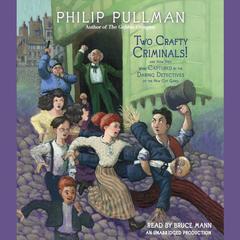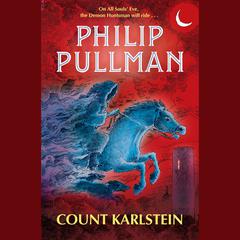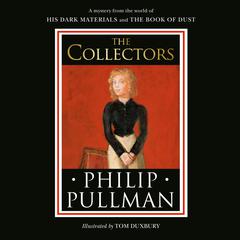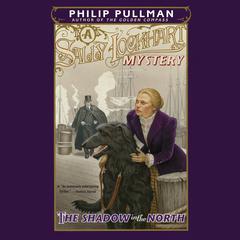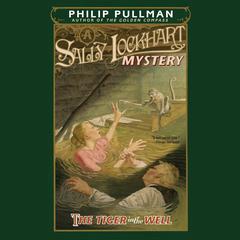 Play Audiobook Sample
Play Audiobook Sample
The Good Man Jesus and the Scoundrel Christ Audiobook
 Play Audiobook Sample
Play Audiobook Sample
Quick Stats About this Audiobook
Total Audiobook Chapters:
Longest Chapter Length:
Shortest Chapter Length:
Average Chapter Length:
Audiobooks by this Author:
Publisher Description
This is a story.
In this ingenious and spellbinding retelling of the life of Jesus, Philip Pullman revisits the most influential story ever told.
Charged with mystery, compassion and enormous power, The Good Man Jesus and the Scoundrel Christ throws fresh light on who Jesus was and asks the listener questions that will continue to reverberate long after the final word is spoken. For above all, this audiobook is about how stories become stories.
Download and start listening now!
"When I first picked up this book, I was curious. As I read, I found the story a bit disturbing. Though, remembering it's fiction, labored onward. Then, I found myself associating with the characters: first, Jesus when he was preaching the good word and then Christ when he questioned the stranger about certain stories Jesus was telling. I would recommend devouring this book in one sitting (or so) for the best read."
— Jennifer (4 out of 5 stars)
The Good Man Jesus and the Scoundrel Christ Listener Reviews
-
" That a fiction author can refashion the myth of Jesus into one that makes infinitely more sense and presents a vastly more appealing view of spirituality than the one on which millions of people throughout history have built their lives, speaks both to the timeless wonders of storytelling and the hollow nature of religion. Not much is changed in this retelling, except for what happens behind the scenes-- and it makes all the difference. Although well-written and philosophically insightful, it is ultimately a story I've heard before, with embellishments that aren't entirely unexpected to an atheist. I'd definitely recommend the book to thoughtful young adults and those who haven't yet considered the inevitable role of myth in even widely accepted religions. "
— Chrissy, 2/16/2014 -
" In the interests of full disclosure, I will say from the start that I am a Christian who is committed to the historical veracity and authority of the New Testament account of the life of Jesus, the Christ. I realize that this commitment inherently colours my perspective on both the Bible and the book I am currently reviewing but of course no more than Philip Pullman's admitted and overt anti-theism colours his take on the first four books of the New Testament (and the rest for that matter). There is a popular belief out there that says atheists approach religion and the Bible on a rational, objective, neutral basis where as subscribers to the faith are subjective and irrational. The foolishness of this can be seen on the face of it. I readily admit that Christians don't embrace or examine their faith with pure rationalist logic...far from it. However they are not devoid of logic either and the atheist embraces his or her secular-humanism with every bit as much faith as the most devout saint posses. Also, right off the start, I want to acknowledge that I am aware that the cover of Pullman's book states loud and clear that, "this is a story" as if that disclaimer preemptively answers any criticisms to his reinvention of the gospel narratives. I realize this is a fiction, Pullman's own version. However, since he is presuming to deconstruct and reinvent something as pivotal and as immense as the life of the historical Jesus, he cannot duck out of criticism simply by saying, "hey, I told you this is a story". So...to the book. Unlike some of the reviews I've read, I was not wowed by the ingenious originality of this tale, mainly because there was very little originality to be found. In fact, much like my experience of The DaVinci Code, as I was reading I couldn't help thinking at least once a chapter how old and tired this all sounded. Like Dan Brown's shameless robbery of the central premise and many of the details of the authors of The Holy Blood and The Holy Grail, Pullman turns the "de-mythologizing", pseudo-scholarship of Liberal theologians of the past two centuries into a fictional account of the life of Jesus Christ and the origins of the Christian religion. In this project he proceeds along the familiar lines of separating the supposed tiny kernel of historical Jesus (just a good Jewish moral teacher) from the vast and distorted post-Christ mythologizations of those who used Jesus as an opportunity to construct a cult to challenge the existing power structures and replace it with their own. Like a one man Jesus Seminar, Pullman seeks to sift out the probable historical events and teachings from all supposed glosses, inventions, edits, and manifold additions of post-Christ church leadership. The literary device he uses to accomplish this in a narrative work is to divide the historical Jesus into twin brothers: Jesus, a human, red-blooded, honest Jewish teacher of the golden rule with a keen perception of human nature, and Christ, his underhanded, lowlife, back stabbing, power-hungry alter-ego of a brother whom one can nevertheless identify with. I think this is the only original part of this book. Pullman rewrites his way chronologically through the gospel story, systematically attacking one cardinal orthodoxy after another, from the virgin birth (a naïve Mary consents to sleep with a town boy because he tells her he is an angel messenger from God and she has been chosen for a special honour), to Jesus' miracles (which are just acts of kindness or bold statements that the growing excitement of the crowds turn into rumours and stories of the miraculous), to the death and resurrection (the body was taken by those who wished to perpetuate the stories of Jesus divinity in order to use them to accomplish their own political ends), and many things in between. Again, nothing particularly new here as the gospels were long ago sifted by those wishing to retain the title `Christian' but were embarrassed by all the super-natural baggage and salvation language that such a handle brought with it. The true center of this book is the prayer of Jesus in the garden just prior to his arrest and trial. Far from the emotional struggle of the biblical account, where Jesus, knowing his vicarious death was hard upon him, desires in his humanity to avoid the pain and separation, but trusts his heavenly Father and famously declares "nevertheless, not my will but Thine be done", here Jesus' last prayer is an angry outburst of frustration at the silence and indifference of a God he has finally lost faith in. To call this a thinly veiled projection of Pullman's own feelings toward the God of the Bible would be gross understatement. It is yet one more example of the two controlling tenets of atheism: 1) there is no God, and 2) I hate him. I must take exception to another reviewer's opinion as the prose in this book was anything but lyric and I believe Pullman himself would agree with me. Due to the nature of this story the plain, unadorned prose suited the genre better than flowery description which one never typically finds in mythology or in the Bible (but for the poetic books). From my perspective, however, the style was the only strength of this book and if zero stars was an option on Amazon, that is what I would have rated this book. Strictly considered, I found this to be a well written (from a technical perspective, genre constraints considered) fictionalization of some worn-out secularist liberal theological railings against the historicity of the Bible's accounts of Jesus life and works. That is to say, it was like an incorrectly balanced ledger, where all the numbers and totals are nevertheless written with admirable penmanship. But however aesthetically pleasing the handwriting might be, the sums will leave you in trouble with the tax man when he audits you. This book is the rebellious attempt to remove redemption from the redemption narrative by a man who refuses to admit his own spiritual bankruptcy and need of the Jesus Christ he is trying to rid history of. But one recalls the age old maxim, that the Christian faith is an anvil that has worn out many hammers. For those wishing to read something from an intelligent pen that takes a very different perspective on the life and ministry of Jesus Christ, try Malcolm Muggerige's JESUS: THE MAN WHO LIVES., G.K. Chesterton's EVERLASTING MAN, THE, C.S. Lewis's Mere Christianity or, N.T. Wright's Simply Christian: Why Christianity Makes Sense orThe Original Jesus: The Life and Vision of a Revolutionary. "
— Dan, 2/7/2014 -
" A fascinating concept that somehow didn't live up to its potential in execution. "
— Marzie, 1/7/2014 -
" I think this book gives a credible and probably quite popular understanding of the events that happened surrounding the life and death of Jesus and the scoundrel Christ. "
— William, 12/23/2013 -
" I loved this book! It was interesting reading someone's take on classic religious stories. "
— Kate, 11/7/2013 -
" This book is wonderful. Totally readable and offers up a plausable interpretation of the gospels. Fascinating. "
— Mish, 11/5/2013 -
" It's no _Last Temptation of Christ_ or _Lamb_, but it was good enough. I'm sure it has been ruffling quite a few feathers since its publishing. "
— Gregory, 9/3/2013 -
" This book was masterful. "A story of how stories become stories" "
— Justin, 8/26/2013 -
" Audio book read engagingly by the author, was an interesting take on the miracles reported in the Bible. You see, Jesus and Christ were twins, with very different personalities and sensibilities. . . "
— Ljonz, 6/23/2013 -
" I didn't like the parable style of writing, but I liked the unusual concept. He put a lot of thought into creating a believable controversy. Great conversation starter for bookclub. "
— Trish, 10/27/2012 -
" Probably the most heretical book I've read. There's a real sympathy for both the characters Jesus and his brother Christ. They don't have much of a relationship though - the main relationships are between Jesus and silence, and between Christ and a mysterious stranger. A quick read. "
— Jens, 10/23/2012 -
" It has been quite some time since I read a book in one sitting but this one made me not get up once. The story makes you wonder about the possibility of the whether this actually could have happened. Jesus' twin brother as Judas, quite interesting... "
— Robin, 9/13/2012 -
" I know where Pullman was going with this (Jesus had a good message but Christianity the religion messed it up) but it was a little over simplistic. "
— Mike, 8/31/2012 -
" An interesting take on Bible stories but ultimately not as good as I was expecting given Pullman's previous writing and the hype about this book. "
— Geraldine, 6/6/2012 -
" Reasonably interesting concept, but ultimately... Meh. "
— Mathew, 5/16/2011 -
" More of a good idea than a good execution. "
— Dustin, 5/15/2011 -
" Expect a bit more from this book and Philip Pullman after His Dark Materials. "
— Matt, 5/8/2011 -
" While I adore most things Pullman, this is one of his weaker works. If you want a better, and more humorous book in a similar vein, I suggest Lamb, the Lost Gospel of Christ (I may have messed up the title) "
— Sydney, 5/2/2011 -
" A strange book, on one hand I wanted to keep reading but I'm not sure why. The writing style didn't really flow for me but it was an interesting book nevertheless. "
— Matthew, 4/22/2011 -
" Really enjoyed this re-telling of the story of Christ. "
— Farhan, 4/19/2011 -
" It did not quite live up to my expectations. At the end of it some really good points were made, but the way there felt a bit trivial, even though I somehow also must say that it really isn't trivial. Not sure how to put it. I recommend it, though. Fascinating way of retelling a story! "
— Anders, 4/17/2011 -
" Basically a cliffs notes version of the New Testament with one slightly subversive idea. It's the slightly subversive idea that gives this the bump to two stars. Not even that well written. Philip Pullman, you really phoned this one in. "
— Erin, 4/13/2011
About Philip Pullman
Philip Pullman is the Whitbread Award–winning author of the bestselling His Dark Materials series—The Golden Compass, The Subtle Knife, and The Amber Spyglass—as well as the Sally Lockhart trio of Victorian mysteries and other books for young readers. Among his other awards, he has won the prestigious Astrid Lindgren Memorial Award in honor of the body of his work.












